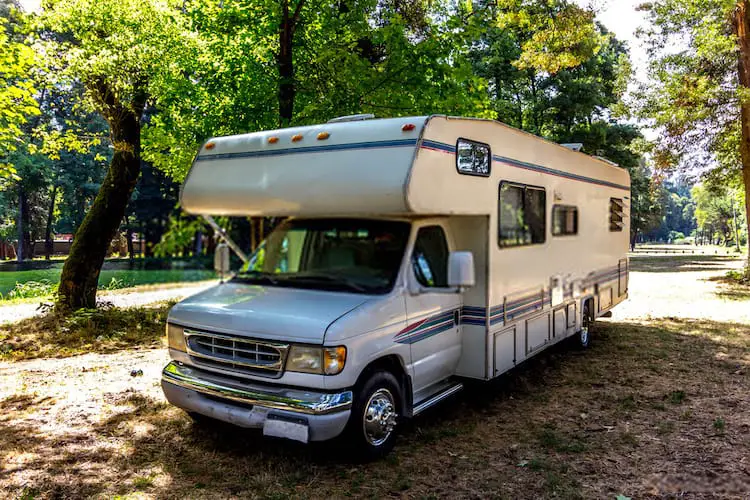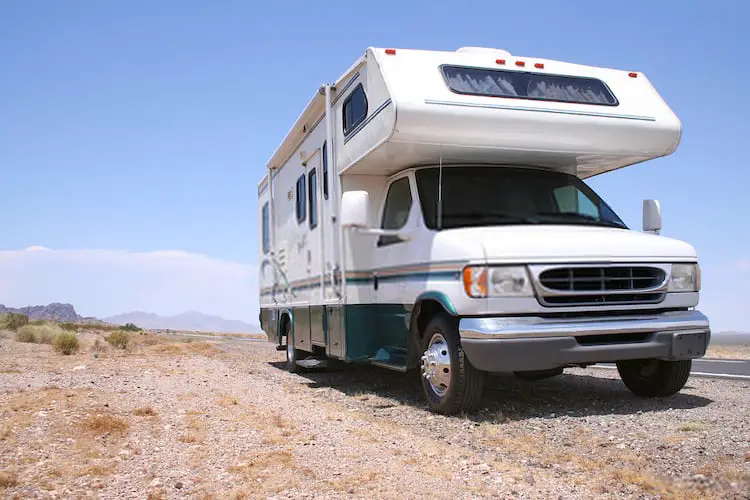Published Date: August 13, 2020
Last Updated on June 22, 2023 by Camper Front
Exactly how much does a motorhome weigh? If you’ve ever wanted to get an idea of this, this article was written with you in mind.
Traveling by motorhome can be exciting and a great way to explore new destinations. But when scouting for a new one, you need to know all of its specs, including its weight. This is because its weight has a direct strain on your gas mileage.
The first thing you need to know is that there are different classes of motorhomes, and they all have their limits on how much weight they can accommodate. So, in this article, we’ll be talking about the average weight of a motorhome.
Table of Contents
You Might Also Be Interested In: How to Pick a Camper Lock Using a Bobby Pin
How Much Does a Motorhome Weigh?

- Bus-shaped Class A motorhomes weigh 16,000-30,000 pounds.
- Class B Van-type motorhomes weigh 4,000-14,000 pounds.
- Class C motorhomes (larger than Class B’s) usually weigh 12,000 to 20,000 pounds.
Now that’s just a summary; let’s get into details.
Class A Motorhome
A Class A motorhome is basically an RV that looks like a transformed bus. They range in size from 21 to 40 feet and weigh between 16,000 and 30,000 pounds.
Class A motorhomes come with different configurations and amenities that sometimes equal them to most luxurious homes.
Some of these amenities may include a “basement” for storage, king-size beds, and full-size kitchens, to mention a few of the elegant features of these Motorhomes.
They also come with push-button slide-outs, which expand their living space when opened— it adds several square feet of floor area.
Class A motorhomes are more expensive than other types of motorhomes, but they are larger and contain both the towing vehicle and the living space, which makes up for their price.
You Might Also Be Interested In: Conventional Towing vs 5th Wheel Towing
Class B Motorhome
Class B motorhomes are also called “van conversions” or camper vans. As the name implies, they are built over a van chassis, so it’s basically a large van, in which several rows of the van seats have been removed, and replaced with beds, chairs, a small bathroom, and a small kitchen area. That’s a Class B Motorhome.
They have lengths ranging from 16-22 feet and weigh between 4,000 and 14,000 pounds; this makes class B motorhomes the smallest of the three classes of motorhomes.
Their smaller size and maneuverability make parking class B’s motorhomes relatively easy, especially when looking for the perfect Creekside spot.
Although class B types of recreational vehicles may not be as large as class A’s and C’s, they are well-appointed and able to accommodate two passengers in relative comfort.
They have a full stand-up room, which makes moving about easy. This is accomplished by raising the roof and/or dropping the floors to create enough headroom for occupants.
Class C Motorhome
If Class A looks like a bus conversion and Class B is a van conversion, then you can call Class C motorhomes a large pickup truck conversion using a truck chassis.
Which is basically what these different classes of motorhomes are. Recognizing a Class C RV is pretty easy as they have an extension over the “truck cabin” called the “cabover” and it can be sectioned and configured as storage space, or as a large bed in most class C units.
Class C motorhomes range in length size from 21-35 feet and have a weight range of 12,000 to 20,000 pounds.
The Living areas of class C motorhomes include bathrooms, a kitchen, entertainment systems, storage, and sleeping space for up to two to six people.
It is powered by gas or diesel engines, and they can be used to tow a small vehicle that can be used to run around once you reach the campsite.
You Might Also Be Interested In: Do You Need A CDL To Drive An RV
Knowing The Length, Weight, and Height of Your Motorhome

As we all know, owning an RV of any kind requires quite a bit of research.
But as always, these days, having the internet always comes to the rescue a lot of time as it can help you be fully prepared for your camping stay.
Before investing in a Motorhome, you have to know the specs simply because some campgrounds don’t have big enough spaces for the longest class A motorhomes!
The longest length allowed most times is 45 feet long, and even then, that is very rare. Most campgrounds usually stay below the 40 feet mark for how long an RV can be.
Camping in places like National Parks, which are a little shorter than an average campground.
They usually have a length mark of about 28 to 35 feet long, so if you are planning to visit these parks, that is something you should be aware of.
It has been noted severally that most RV companies’ numbers are not always completely accurate.
So If you are worried about getting being sold the wrong size, you can bring your own tape measurer when shopping around, and make sure the length is in accordance with the campgrounds you are interested in.
If you plan on towing a car, that will also add to the length of your RV, especially when you are using a class B Motorhome, but When it comes to class A and class C motorhomes, you won’t be needing a car.
And If you do really want to have extra transportation, you can opt into bringing bikes with you.
If you really need a car, ensure to call ahead and make sure there is room for the vehicles, and if you are lucky enough, you can find a campground willing to accommodate them.
On average, 35 feet long is an excellent length for a Motorhome. It is long enough to have a nice interior with all the basic amenities you need while also being short enough to fit into the majority of campgrounds – whether it is National Parks or not.
The main cause for concern is not actually the campgrounds but the roads! Believe it or not, there are certain roads with certain lengths of RV restrictions on them.
Sounds unbelievable but it’s true, there are actually a few roads in which there are restrictions.
So before heading out, make sure to do some research on the area you are visiting to make sure there won’t be any form of disturbance on the way.
Also, when it comes to the height of a Motorhome, it is not something to really worry about.
There are not many bridges these days that don’t allow eleven feet or smaller. You don’t really have to worry about the height of your RV as it has fewer chances of posing a problem.
You Might Also Be Interested In: What is The Weight of a Pop-Up Camper?
So, How Much Does a Motorhome Weigh? It depends…
There are different types of Motorhomes from the relatively lightweight Class B camper vans to the big and well-equipped Class A giants – and everything in between.
We hope we have answered the question: How much does a Motorhome weigh? Now, keep it in mind when buying and using an RV.

